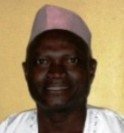 When Dr. Ladan-Ibrahim Hassan arrived at his new office at the Kebbi Hospital in northern Nigeria, he found a woman living there. Many years ago this woman had labored at home only to deliver a dead baby, and when thereafter she discovered that she was leaking urine her relatives rejected her. The woman moved permanently to the hospital and was written off as mentally unstable. Dr. Ladan-Ibrahim learned that while the woman was living at the hospital she reported that she had been raped. The woman delivered a baby girl, remaining at the hospital and leaking urine still.
When Dr. Ladan-Ibrahim Hassan arrived at his new office at the Kebbi Hospital in northern Nigeria, he found a woman living there. Many years ago this woman had labored at home only to deliver a dead baby, and when thereafter she discovered that she was leaking urine her relatives rejected her. The woman moved permanently to the hospital and was written off as mentally unstable. Dr. Ladan-Ibrahim learned that while the woman was living at the hospital she reported that she had been raped. The woman delivered a baby girl, remaining at the hospital and leaking urine still.
As a surgeon who has repaired obstetric fistula for more than twenty years, Dr. Ladan-Ibrahim was all too familiar with the woman’s medical condition. He offered to operate on the woman, paying for the costs of the necessary supplies. After the surgery, she no longer smelled of urine or suffered from the uncontrollable leaking. The woman’s apparent psychological problems disappeared too, much to Dr. Ladan-Ibrahim’s surprise. The woman now works as a cleaner for Kebbi Hospital, preferring not to return to the relatives who once had shunned her.
It is memories like this one that motivate Dr. Ladan-Ibrahim to continue his work with fistula clients. Dr. Ladan-Ibrahim is the head of clinical services at the Federal Medical Center in Kebbi State, where he provides fistula repairs in addition to performing cesarean sections, hysterectomies, and other operations. Kebbi Hospital is a government-run facility that receives USAID support through the Fistula Care Project to improve its maternal health and fistula repair services.
Dedicated surgeons like Dr. Ladan-Ibrahim are an important resource in northern Nigeria and places like it, where the burden of obstetric fistula outstrips hospitals’ capacity to provide fistula repair. Dr. Ladan-Ibrahim serves as a trainer, teaching younger doctors the skills they need to transform the lives of women with fistula.
USAID supports activities to prevent and treat fistula in 11 countries, primarily in Africa. The Fistula Care Project is a five-year cooperative agreement led by EngenderHealth and its partners. Its aims are to increase access to quality fistula repairs and to engage governments, institutions, facilities and communities in preventing fistula. In Nigeria, Fistula Care supports training and equips hospitals to provide repair. It also periodically brings together surgeons from different health facilities to pool their efforts to carry out fistula repair campaigns.
Even though Dr. Ladan-Ibrahim has been a part of the effort to treat fistula across six northern Nigerian states, he recognizes that much of the problem of obstetric fistula lies beyond him: Many pregnant women do not receive assistance from a skilled provider at the time of delivery. The key to addressing fistula is prevention – ensuring that all women have access to quality emergency obstetric care when needed. As Dr. Ladan-Ibrahim reminds us, “If we can get good, fundamental care for maternal health that is affordable, accessible and acceptable, fistula will disappear.”


